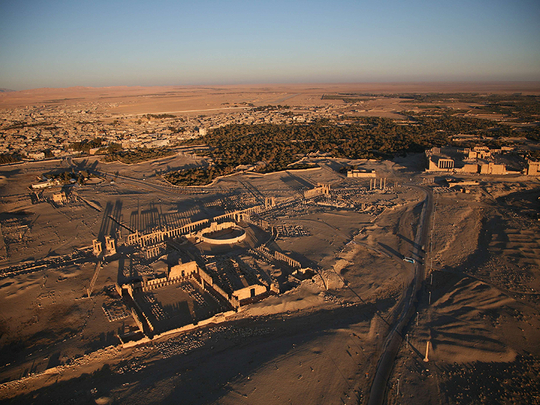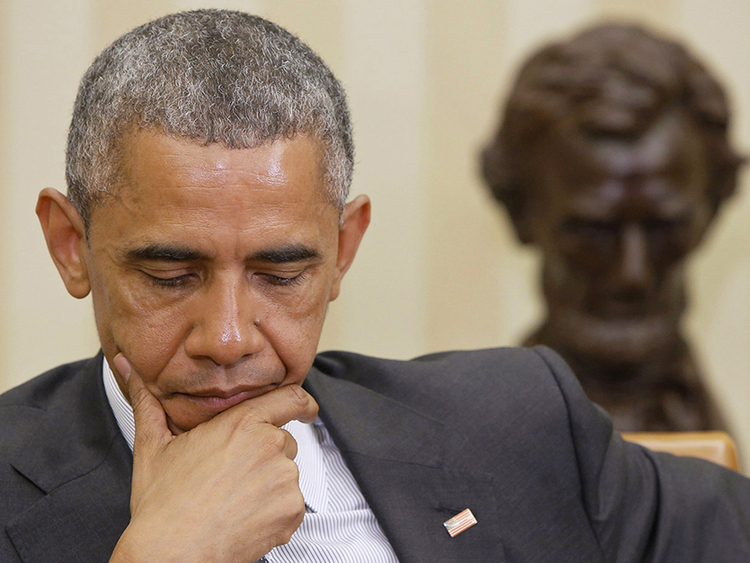
DAMASCUS: Daesh (the self proclaimed Islamic State group) on Friday kept up a counter-offensive that has rocked US strategy, seizing a key border crossing after capturing an Iraqi provincial capital and a renowned Syrian heritage site.
The militants, who now control roughly half of Syria, reinforced their self-declared transfrontier "caliphate" with the capture of the Al Tanaf to Al Walid crossing on the Damascus-Baghdad highway.
It was the last border crossing with Iraq still held by the Damascus government. Except for a short section of frontier in the north under Kurdish control, all the rest are now held by Daesh.
The militants surge, which has also seen them capture Anbar capital Ramadi and the ancient Syrian city of Palmyra in the past week, comes despite eight months of US-led air strikes aimed at pushing them back.
It has sparked an exodus of tens of thousands of fearful civilians in both countries and raised fears that the militants will repeat at Palmyra the destruction they have already wreaked at ancient sites in Iraq.
President Barack Obama played down the Daesh advance as a tactical setback and denied the US-led coalition was "losing" to Daesh.
But French President Francois Hollande said the world must act to stop the extremists and save Palmyra.
UNESCO chief Irina Bokova called the 1st and 2nd Century ruins "the birthplace of human civilisation", adding: "It belongs to the whole of humanity and I think everyone today should be worried about what is happening."
As the militants fanned out across Palmyra on Thursday, they went door to door executing suspected loyalists of the Damascus government, the Syrian Observatory for Human Rights said.
At least 17 people were killed, the Britain-based monitoring group said.
Syrian state media said loyalist troops withdrew after "a large number of Daesh terrorists entered the city," which lies at a strategic crossroads between Damascus and the Iraqi border to the east.
Daesh proclaimed Palmyra's capture online and posted video and stills footage of its fighters in the city's air base and prison, long notorious for its detention of regime opponents.
The militants did not immediately post pictures of the UNESCO-listed world heritage site with its colonnaded streets, elaborately decorated tombs and temples.
Daesh sparked international outrage this year when it blew up the ancient Assyrian city of Nimrud in northern Iraq.
Syria's antiquities director Mamoun Abdulkarim said he feared a similar fate awaits Palmyra, and urged the world to "mobilise" to save it.
Half of Syria
Daesh now controls "more than 95,000 square kilometres in Syria, which is 50 per cent of the country's territory," the Observatory said.
Fabrice Balanche, a French expert on Syria, said "Daesh now dominates central Syria, a crossroads of primary importance" that could allow it to advance towards the capital and third city Homs.
"Taking Palmyra opens the way to Damascus and Homs. Eventually, this axis can be threatened," he said.
Matthew Henman, head of IHS Jane's Terrorism and Insurgency Centre, said the Daesh advance boosted its claim to be the most effective of the armed groups fighting to overthrow President Bashar Al Assad.
"It reinforces Daesh's position as the single opposition group that controls the most territory in Syria," he said.
The militant rivals of Daesh, Al Qaida affiliate Al Nusra Front, have also been on the offensive as part of a rebel alliance that has stormed through nearly all of the northwestern province of Idlib.
The rebels on Friday overran a hospital in the town of Jisr Al Shughur where at least 150 regime forces and dozens of civilians were trapped for nearly a month, the Observatory said.
It said dozens managed to escape but despite a pledge from President Bashar Al Assad to rescue them, others were killed.
Palmyra's takeover came days after Daesh seized the Iraqi city of Ramadi, their most significant victory since their lighting advance across swathes of northern Iraq last summer.
On Thursday, Daesh pushed further and seized Iraqi positions east of Ramadi, officials said.
Obama blamed the "setback" in Ramadi on a lack of training and reinforcements for the city's garrison.
"I don't think we're losing," he told news magazine The Atlantic.
"The training of Iraqi security forces, the fortifications, the command-and-control systems are not happening fast enough in Anbar, in the Sunni parts of the country."
The Pentagon said Iraqi forces retreated from Ramadi partly because they incorrectly believed a sandstorm was preventing US-led aircraft from coming to their aid.
Russia said it was prepared to deliver weapons after Iraqi Prime Minister Haider Al Abadi asked for support during a visit to Moscow.
Obama denied the US-led coalition was "losing" to Daesh
Washington: President Barack Obama said in an interview that the US is not losing the fight against Daesh radical group in Iraq and Syria, but he acknowledged that it will be necessary to intensify the training of fighters in some zones to support Iraqi military forces.
"I don't think we're losing. There's no doubt there was a tactical setback, although Ramadi had been vulnerable for a very long time," Obama said in an interview with news magazine The Atlantic, a few days after the Iraqi city of Ramadi was overrun by Daesh fighters.
Obama blamed the Daesh capture of Ramadi, the capital of Al Anbar province, on the lack of training and reinforcement of Iraq's security forces.
"They have been there essentially for a year without sufficient reinforcements," he said, adding that "it is indicative that the training of Iraqi security forces, the fortifications, the command-and-control systems are not happening fast enough in Anbar, in the Sunni parts of the country".
He also admitted that it is necessary to do a better job in enlisting tribesmen in Al Anbar province to fight against the Daesh, something the national government has not been doing.
Meanwhile, in the north, the Iraqi Kurdish forces have kept the Daesh at bay while the US-led international coalition has been carrying out airstrikes on the militants since last autumn across a wide area running from northwestern Syria to the outskirts of Baghdad.
Obama, however, denied once again that he is considering sending US ground troops into Iraq.
"There's no doubt that in the Sunni area we're going to have to ramp up not just training, but also commitment, and we better get Sunni tribes more activated than they currently have been," he said.
The White House has been the target of harsh criticism since Daesh militanst gained a significant advantage over the Syrian army by taking the city of Palmyra, a move that put the jihadis in control of more than half of Syrian territory.












